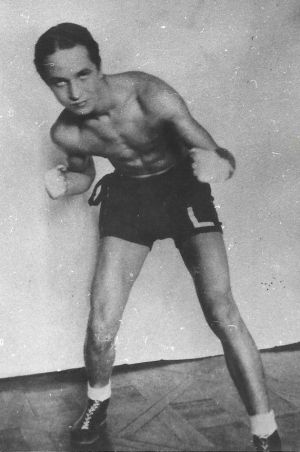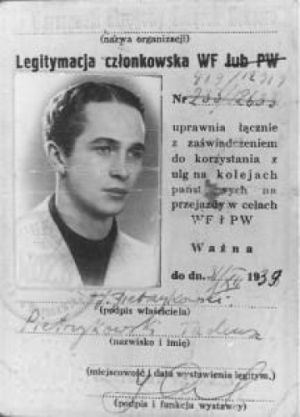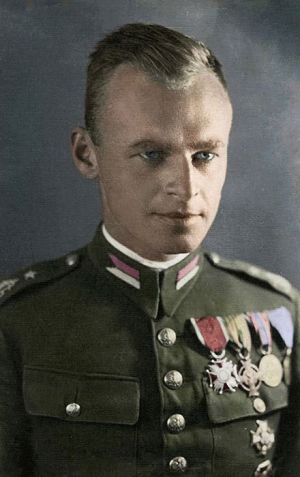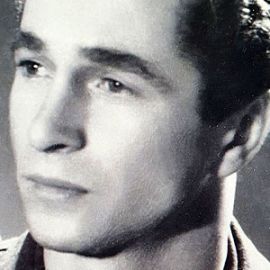
Tadeusz Pietrzykowski
The Boxer from Auschwitz
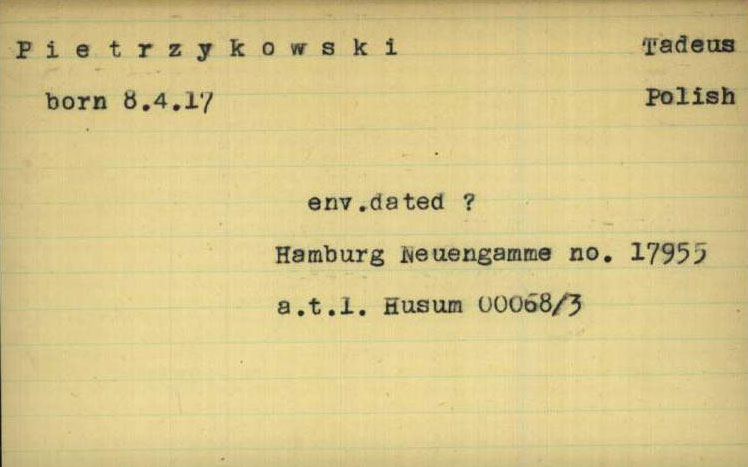
Tadeusz Pietrzykowski was born on April 8, 1917 in Warsaw. Shortly before the outbreak of World War II, he achieved a series of victories and successes, obtaining the title of Polish vice-champion and champion of Warsaw in the bantamweight scale. He was commonly known as "Teddy" and he entered the chronicles of Polish sport under this pseudonym. "Teddy" was a glider pilot and intended to become an aviator. With this in mind, he decided in the spring of 1940 to go to France - like thousands of other volunteers - to join the Polish army that was being created there, which was formed by General Władysław Sikorski. His risky attempt has failed.
On June 14, 1940, the Nazis sent the first transport of political prisoners - Poles to KL Auschwitz. At that time, 728 men were brought from the prison in Tarnów. Most of them were junior high school students, students and participants of the defensive war of Poland in 1939, who made an unsuccessful attempt to reach the Polish Army in France. Among them was Tadeusz Pietrzykowski, who was captured near the Hungarian - Yugoslav border and taken to Auschwitz.
In March 1941, Pietrzykowski joined the Auschwitz resistance movement, Związek Organizacji Wojskowej (Military Organization Union), working directly under Witold Pilecki. A few months later he took part in an assassination attempt against a high-ranking German officer in the camp, commandant Rudolf Höss, by helping to sabotage the saddle of Höss' horse. The assassination attempt failed, but resulted in Höss breaking a leg. The incident was classified as an accident by the Germans, and the prisoners were not punished. Later, Pietrzykowski killed Höss' dog, which had been trained to attack Jewish prisoners and had killed at least one of them. The dog was cooked and eaten by the prisoners. Pietrzykowski was also involved in other resistance activities, such as passing information and sabotaging labor activities.
He was saved from the inevitable extermination in the camp by accident, which Tadeusz Pietrzykowski recalled years later:
"I started the boxing fights in Oświęcim in March 1941. Then I accidentally played a match with the German kapo Walter Düning, who had already been boxing before the war and even won the title of professional middleweight champion in Germany. We had a day off on Sunday. A large group of prisoners gathered in front of the camp kitchen. One of them ran towards me and shouted, “Teddy, you want a piece of bread, come quickly. There is a German boxer among us. I'm looking for someone to box with him and beat him. The winner will be rewarded with bread ». I weighed 42 kg, but decided to fight right away. I saw a perfectly built blonde, holding gloves that we used in winter during our work. When I was seen, the crowd laughed because I was very skinny.
The opponent asked me in German if I wanted to fight, I answered yes. A fight ensued and my technical skills saved me. Using them, I successfully defended myself against the attacks of a much stronger and much more weighty opponent. At one point, Walter Düning lowered his gloves. He stopped fighting and, appreciating my advantage over him, asked which commando I would like to work in. I replied "Tierpfleger" knowing that there could be additional food such as bagasse, swede and carrots. I was given this assignment and from then on I started feeding the cows and calves. At the same time, I became known as a boxer and in the Auschwitz camp I fought numerous fights with boxers, whom the SS men searched for in the newly arrived transports, and organizing attractive shows for themselves.’’
In total, "Teddy" fought about forty boxing fights in the Auschwitz camp, although some say that there were even sixty of them. Almost all of them won. Later he was imprisoned in Neuengamme. It was a camp near Hamburg, where Tadeusz Pietrzykowski's sensational duel with the German boxer Schally Hottenbach took place. Hottenbach weighed 96 kg and was the runner-up in the American world of professional boxing in light heavyweight. The winner of Schally Hottenbach and about twenty other boxing fights fought by him in Neuengamme finally saw freedom in Bergen-Belsen, liberated on April 14, 1945 by Allied soldiers.
He died on 18th April 1991 in Bielsko-Biała, which is a city not that far from Oświęcim.
Story provided by my friend Tomasz Drzewiecki, check out his instagram
Personal images
Click the images to enlarge
Share on social media
The stories on my website educate about WWII. Please help by sharing them with your family, friends and on social media. Thank you!
